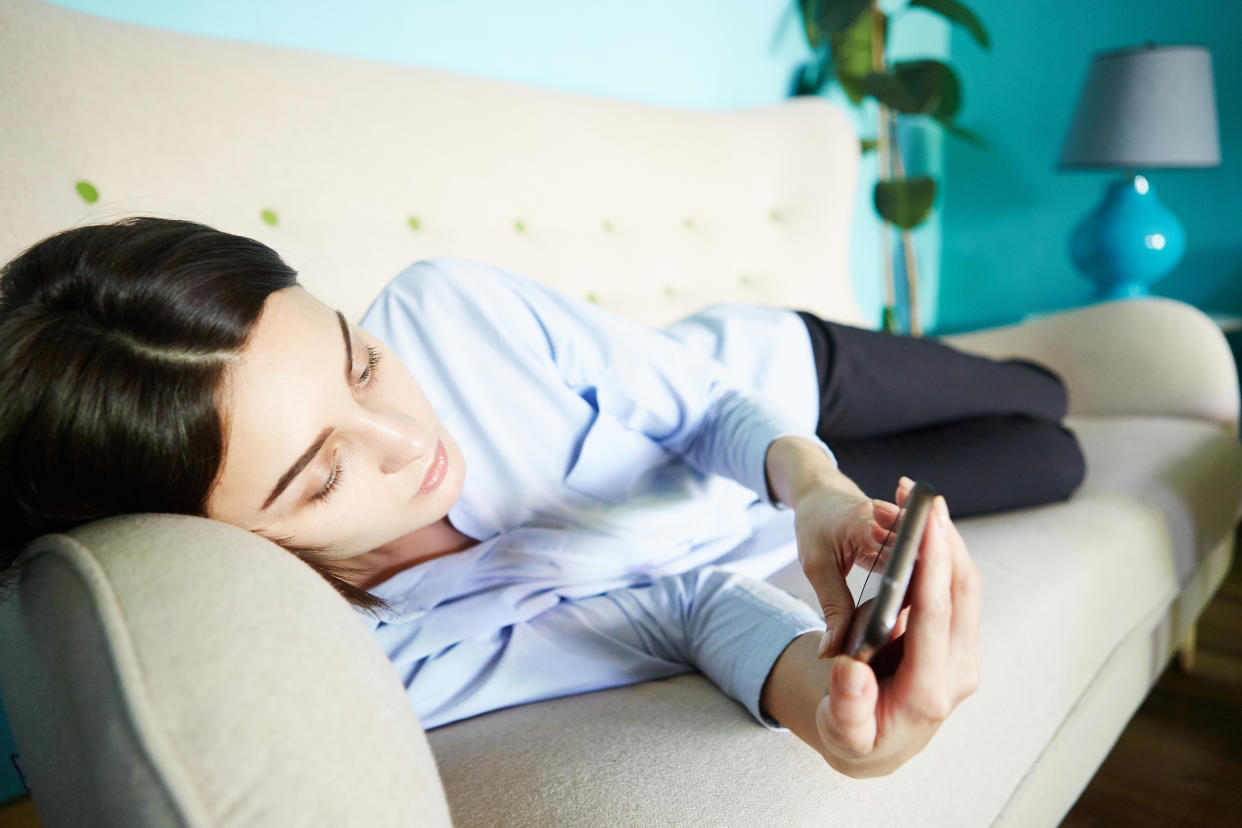Why we're obsessed with reading bad news — and how to break the 'doomscrolling' habit

We've all done it before — the incessant scrolling through Instagram and Twitter that seems to bring about feelings of inadequacy — a habit that experts call “doomscrolling” or “doomsurfing.”
This behavior, which Mirriam-Webster defines as the "tendency to continue to surf or scroll through bad news, even though that news is saddening, disheartening, or depressing” has only worsened as 2020 churns out COVID-19 panic, police brutality sparking country-wide protests and the upcoming November presidential election.
"Doomscrolling is the habit of endlessly scrolling through social media in a desperate search for clarity, " Bethany Baker, the executive director of online wellness non-profit A-GAP, tells Yahoo Life. "[It's] falling down the rabbit hole.”
And the habit isn’t new. “We’ve been talking about [this] for years, but people have become more aware of it,” she says. “With physical distancing, studies have shown that people’s time online has increased significantly, sometimes doubling...[and] studies show that the more time spent on social media, regardless of [the platform], can lead to anxiety, depression and loneliness [which can be] factors for suicide." A study published in the Journal of Abnormal Psychology found an increase in “mood disorders and suicide-related outcomes” among young adults which author Jean Twenge told NPR could be due to social media and smart phone use.
“We are wired for some negativity bias, which is when we take in negative stimuli more easily and then dwell on it,” Jen Hartstein, Yahoo Life mental health contributor and practicing psychologist, tells Yahoo Life. “There is so much negative information being consumed, that it can consume us. This will inevitably lead to an increase in negative mood, anxiety, sadness and frustration ... there has been an uptick in depression and anxiety overall since quarantine started.”
We’re often not reacting specifically to the content we’re consuming, but giving into “what if?” mindsets, whether it’s overanalyzing Instagram photos posted by your crush or allowing a new development in the coronavirus pandemic to cause anxiety, no matter how inevitable it is.
"Doomscrolling could increase catastrophic thinking since it encourages us to think in terms of worst possible scenarios," psychologist Chloe Carmichael, the author of Nervous Energy, tells Yahoo Life. "In the immediate sense, this creates feelings of fear and sadness. In the long term, it could decrease motivation because making efforts to improve a catastrophic situation might seem futile or overwhelming."
This prepare-for-the-worst mindset can make us vulnerable as consumers and difficult to separate fact from fiction. "Many people use social media to get as many eyeballs on their content as possible, so they might be prone to post extreme headlines or scenarios to create a sense of urgency," Carmichael says. "This can create a distorted picture of what's actually happening in the world...”
Fortunately as consumers, we have the power to decide what to do with all this information and curate social media feeds that are "life-giving" not "life-draining,” says Baker. "We control what we consume, so be intentional about filling that feed more-so with positivity rather than negativity.”
Carmichael also suggests bookmarking several websites or social media pages when drawn to doomscrolling. "It's a lot easier to redirect from something negative when we have a clear and easy path of alternatives waiting to be clicked,” she says.
Using social media proactively, not passively, can also improve your mood. "When you interact with posts — say a friend announces a pregnancy and you comment, like or start a conversation about it — that can be life-giving,” says Baker.
And set time limits for social media usage. "A huge protective factor for emotion regulation is sleep," says Hartstein. "Checking social media before bed isn’t a great idea ... [and] the information isn’t changing as quickly as you are scrolling.”
Stepping back to unplug benefits everyone, no matter the circumstances. “The biggest thing that we encourage is putting healthy tech habits in place," says Baker. "Unless we’re intentional about it, it’s just going to continue to be draining.”
Read more from Yahoo Life:
Why you might see a 'COVID-19' fee on your next restaurant or hair salon bill
From cookouts to fireworks, here's how to celebrate the 4th of July safely during the pandemic
Face shields vs. face masks — here’s which one experts prefer
Want daily lifestyle and wellness news delivered to your inbox? Sign up here for Yahoo Life’s newsletter.
